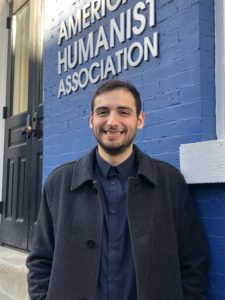Meet the Intern: Andrew Hulett

Please welcome the Appignani Humanist Legal Center’s new legal intern, Andrew Hulett!
TheHumanist.com: What is your educational and work background?
From 2011 through 2015 I studied at SUNY Fredonia, located an hour west of Buffalo, New York—just fifteen minutes from the Canadian border. I majored in criminal justice and minored in psychology with the goal of becoming a lawyer working in social justice and civil rights. For the past three years, I’ve studied at Vermont Law School focusing on these issues, as well as the interplay of discrimination and environmental issues.
TheHumanist.com: How did you first learn about humanism?
I first learned about humanism through the American Humanist Association’s website. After reading about the history and philosophy behind humanism, I realized I have been living as a humanist for quite a while.
TheHumanist.com: Did you grow up in a traditional religious faith? How did it impact you?
I grew up in a Protestant Christian household, with church service and Bible study every Sunday. While it connected my family, I never really bought the morals and supposed peacefulness of the Bible. I was more like a Quaker as I entered my teen years, accepting the existence of a higher power but not placing emphasis on the scriptures of the Bible. However, my world view shifted after taking a World Religions class, where I became fascinated by Buddhism and the idea of karma. Now I maintain an ambiguous spirituality, believing in a higher power but, as mentioned, finding that I align much more with humanism than theistic religions.
TheHumanist.com: What interested you most about working for the American Humanist Association?
AHA’s mission interested me the most. My goal as a lawyer is to help those who are excluded or ignored in our society. AHA advocates for and seeks to protect these marginalized groups. Furthermore, I’ve gained a passion for constitutional law since attending law school and am excited for the opportunity to employ the First Amendment and its Establishment Clause to protect “nontraditional” religions, as well as to protect the separation of church and state.
TheHumanist.com: What book has influenced you the most?
The book that has influenced me the most is The Perks of Being a Wallflower by Stephen Chbosky. As a socially anxious teenager, this book taught me an invaluable lesson: we are all weird and anxious in our own way. It was a humanizing read that helped me feel more connected to the people around me.
TheHumanist.com: If you could have dinner with any three people in the world (living or dead), who would they be and why?
- Sigmund Freud: Freud is certainly a pioneer in the study of psychoanalysis. While his methods and theories are all but discounted in the field of psychology, I would still love to pick his brain.
- Douglas Adams: One of my favorite authors, his epic trilogy, The Hitchhiker’s Guide to the Galaxy, is in my top three book series. Adams was known for his wit, satire, and comedic prowess, and I am sure a dinner with him would be both entertaining and enlightening.
- My grandfather: He played a large role in my life but passed away suddenly eight years ago. I would love another dinner with him to catch up and let him know what I’ve been up to.
